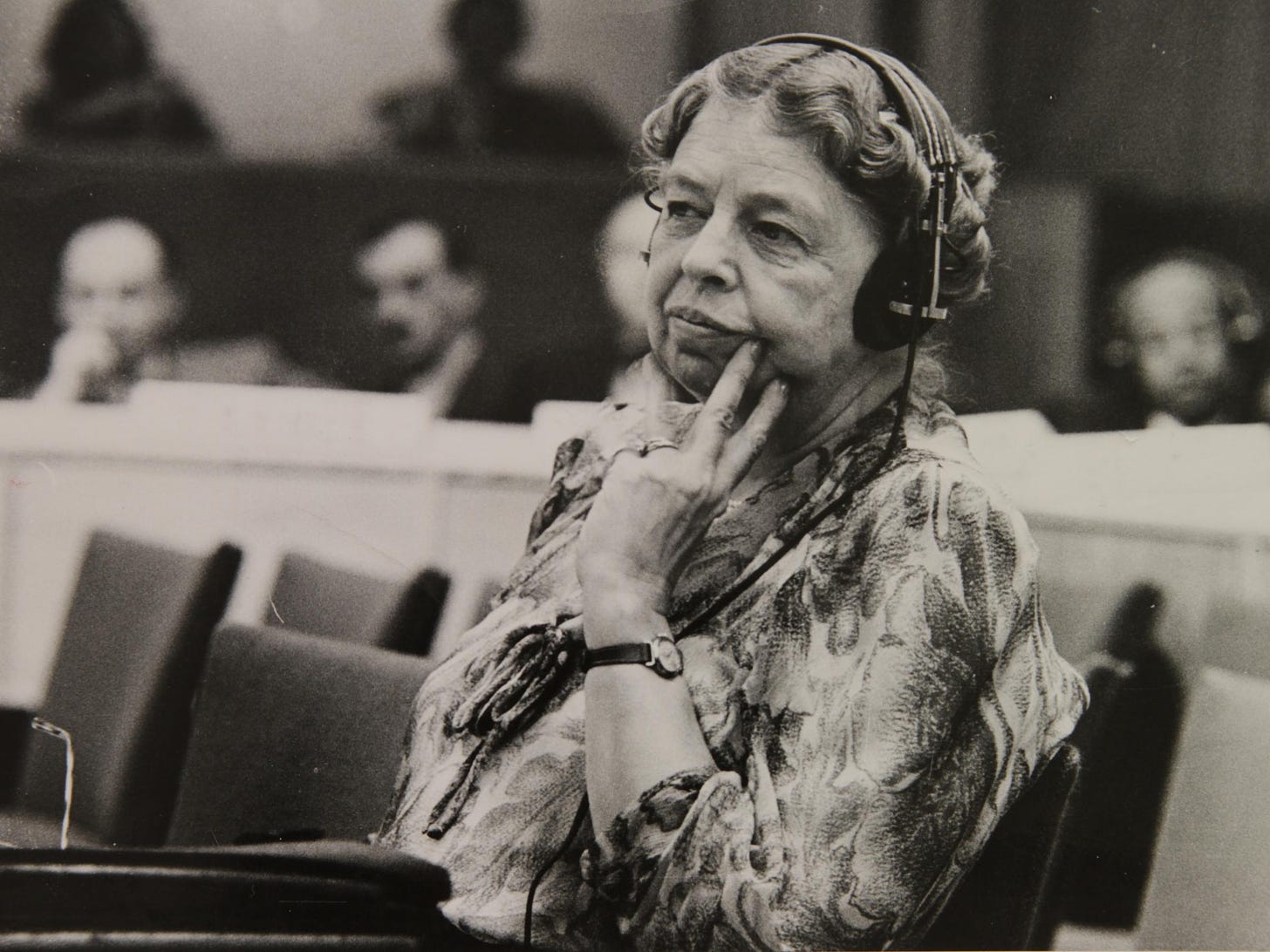Against Human Rights
"Universal Human Rights" are a post-war American invention that were rejected for most of human history, and must be rejected once more
The United Nations Universal Declaration of Human Rights
The American-led post-WW2 social order and its consequences have been a disaster for the human race. At the spear tip of this 73-year slow-motion train wreck is the concept of “human rights”. Human rights, as we understand them, are a relatively new phenomenon, formalised in the United Nations Universal Declaration of Human Rights (UDHR) in 1948.
The UDHR, being an American-led project, draws heavily on the American founding. It marks a clean break from thousands of years of common sense by alleging that humans have innate dignity which confers moral worth. The framers of the UDHR claimed to have arrived at this conclusion by surveying philosophers from diverse cultures and religions. In reality, they cherrypicked the aspects most friendly to the upper-crust American of the time and claimed that it provided an international, cross-cultural consensus.
Against Shared Human Dignity
The very first line of the Declaration celebrates the “inherent dignity and… equal and inalienable rights of all members of the human family”. Throughout almost all human history this idiocy that all humans are equally morally valuable was widely rejected. Universalism and equality are incompatible with human nature. Humans are not equally valuable, never have been, and never will be. Applying moral value universally is how you end up broken or dead at the hands of those who do not share the same naivety. Only in the wealth of post-WW2 America could such delusions prosper.
The idea of shared human dignity offers nothing for weighing up complex decisions. All judgments affecting people at scale will benefit some and harm others. The important question is: to whom will benefit be conferred, and to whom will harm be dealt? It is surely fair to privilege the greatest among us that they may further drive human progress and potential. Unfortunately for us, the UDHR framers had a very different intent: dignifying the lowest forms of human existence as “members of the human family”.
The problem is we are not part of a “human family”. We are part of individual families, and our obligations naturally extend little beyond our close associates. The further people are removed from our own lives, the lower our moral obligation is towards them. We owe more to our family than to our friends, and more to our friends than our countrymen. We owe people we do not know and will never meet, and who live on the other side of the world, absolutely nothing. Contribution to others expands from the self to the immediate family, to the extended family, to friends, to the community, and so forth.
When your material circumstances are comfortable and secure, you have room to ponder the circumstances of abstract persons living on distant continents. Universal moral value implies that you have no right to live in greater abundance than anyone else. Why should subsistence farmers in the Congo be denied the high-definition pornography streaming that you take for granted? “Human rights” posit that the ethical action is to ensure that these people, incapable of producing a high standard of living themselves, are provided with one - by you. The UDHR framers are slipping communism in beneath a thin patina of liberal universalism – many such cases!
Positive Rights VS Negative Rights
Before addressing the individual articles of the UDHR, we will have a quick refresher on the important differences between positive rights, which are generally bad, and negative rights, which are mostly good.
Negative rights are rights that require only that people leave you alone; sometimes they are referred to as “liberties”. Basic rights like the right to freedom of speech and the right to private property are negative rights. If you are the sole survivor of a shipwreck marooned on a desert island, you have all your negative rights by default. Negative rights can only be infringed by the acts of other people.
Positive rights are rights that imply a duty. Someone has a duty to provide “rights” such as the right to healthcare or to social security, either by funding it or directly providing it. On a desert island you have no positive rights because there is nobody for you to extract resources from. These types of rights can be referred to more accurately as “entitlements”.
I don’t intend for this essay to degenerate further into autistic philosophical theoryceling, but suffice to say there is debate surrounding how the positive/negatives rights distinction interacts with enforcement practicalities. This is unimportant. What is important is that negative rights can be clearly defined and limited in scope – the most that negative rights can imply is “leave me alone” – while positive rights are indistinct and unlimited in scope.
These characteristics of positive rights mean that leftist activists love them. Positive rights can be invented out of thin air and create a duty that others are required to perform and may necessitate use of state power. Many positive rights – such as the “right to healthcare” – are essentially limitless in ambition, and therefore limitless in resources that can be extracted in its pursuit.
At the same time as they invent positive rights, these activists seek to limit negative rights. Freshly minted positive rights are put into conflict with long-established negative rights. Your wealth is extracted to provide for increasing entitlements to degenerates under the guise of “human rights”. At the same time, your capacity to object to this is under siege: nobody believes that free speech rights are protected in the West, and Floyd’s 2020 summer of love demonstrated that rights to private property and self-defense are abolished in practice.
The 30 Articles
For brevity’s sake I will not repeat the contents of all the articles of the UDHR here but will focus specifically on the worst and most laughable claims.
Article 1 of the UDHR begins by claiming that humans are “born… equal in dignity and rights” and are “endowed with reason and conscience”, which we have already discussed as being a pipe dream. Things improve little from here.
Article 2 asserts that “everyone is entitled to all the rights and freedoms set forth in this Declaration, without distinction of any kind, such as race, colour, sex, language, religion, political or other opinion, national or social origin, property, birth or other status”. While not particularly controversial, this sets the ground for malignant universalism and fails to provide a justification for why discrimination along these axes is bad.
After skipping a few Articles which list basic negative rights, we come to Article 14, part 1 of which states: “everyone has the right to seek and to enjoy in other countries asylum from persecution”. Sounds great, United Nations, but given the intentionally nebulous definition of “persecution”, and taken in context of Article 2, it means that my country has no right to police its own borders or decide the composition of its own nation.
Article 22 contends that everyone “has the right to social security and is entitled to realization… of the economic, social, and cultural rights indispensable for his dignity and the free development of his personality”. Does anyone know what this actually means? I certainly can make no sense of it beyond providing a rationale for universal basic gibs. While my verbal IQ is insufficient to parse this, I am sure that refusal to grant taxpayer-funded bottom surgery constitutes violation of this article.
Article 24 grants everyone the “right to rest and leisure, including reasonable limitation of working hours and periodic holidays with pay”. Was this document written by Italians? In any case, the framers articulate a very vague positive right, vulnerable to all kinds of verbal chicanery and definitional games. This article can be used to justify crippling resource extraction from you, a hardworking Protestant, to indolent Mediterraneans.
Article 25 is potentially the most important and egregiously vague positive right of the entire document. “Everyone has the right to a standard of living adequate for the health and well-being of himself and of his family, including food, clothing, housing and medical care and necessary social services, and the right to security in the event of unemployment, sickness, disability, widowhood, old age or other lack of livelihood in circumstances beyond his control”.
This is essentially the claim that the post-WW2 welfare state is a human right. What, exactly constitutes an “adequate” standard of living sits unanswered. The question of who will provide the resources for such a project is also unanswered, but you, the reader, are smart enough to understand that you will be picking up the tab. The bill always comes to you, and you are resented and demonised for it.
Practical Effects of the Universal Declaration of Human Rights
As is typical for leftist programs, the UDHR somehow manages to both overstate its importance and be an unmitigated disaster. The UDHR, and human rights advocates generally, are completely useless in reducing global misery yet still consider themselves a beacon of moral authority.
If you take leftists at their word, the UDHR precipitated decolonisation projects across the 3rd world. The constitutions of Algeria, Congo, Chad, Cameroon, Madagascar, Mali, Niger, Rwanda, Togo, Somalia, Mauritania, Senegal, Ivory Coast, Equitorial Guinea, Burundi, and Upper Volta (now Burkina Faso) all refer specifically to the UDHR. What an incredible endorsement. A list of the literal worst places on earth claim to be inspired by the UDHR.
A key contributor to the UDHR was Eleanor Roosevelt, wife of US President and known communist FDR. Reflecting on the Declaration, she said that human rights carried “no weight unless the people understand them, unless the people demand they be lived”. For Roosevelt, the important thing was not to direct change at a justice or legislative level, but rather to “progress inwardly”, “in small places, close to home—so close and so small that they cannot be seen on any maps of the world. They are the world of the individual person”.
Roosevelt’s flowery language reveals the ambitions of the UDHR framers – that their ideals be embedded within the inner world of the individual person. The goal was to affect fundamental cultural, legal, and institutional change by imposition of their values on leaders and citizens worldwide. “The people” in this calculus require both “understanding” of these ideals and must also “demand” that they be lived. This is a closed loop – the people doing the educating are the ones being “pushed” to live out the ideals they already promote. This is otherwise known as “manufacturing consent”.
This totalising impulse is laundered through the UDHR. Formalisation and expansion of human rights necessitates and provides rationale for their enforcement. This becomes doubly dangerous under conditions of limitless positive rights, which are impossible to ever meet completely. A demonic strain of ‘communism with American tendencies’ created modern human rights and cynically weaponises them against enemies both domestic and abroad. A straight line can be drawn from the modern concept of human rights to generations of US foreign and domestic policy disaster.
A Few Arrows
Understand that anyone who invokes the words “human rights” in relation to political debate is manipulating you and wishes you harm. Anyone who appeals to human rights is attempting to deny you the opportunity to discuss things on political terms. They are framing you as against human rights – against the foundation of post-WW2 society itself – to slander you and avoid defending their insane and unhinged beliefs on their merits. The stench of their moral narcissism weighs heavy in the air.






Clear and straight to the point.
‘communism with American tendencies’, sounds like a good description of the technocracy that the GAE is imposing globally today.